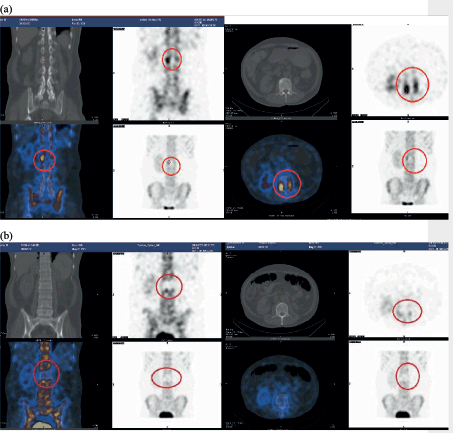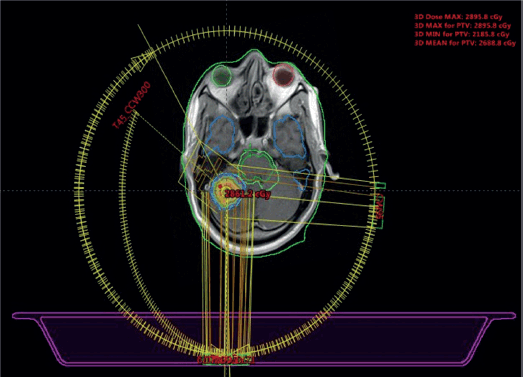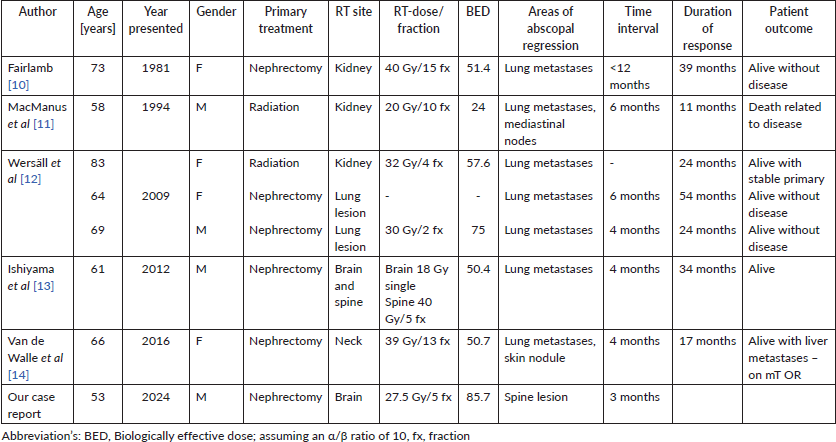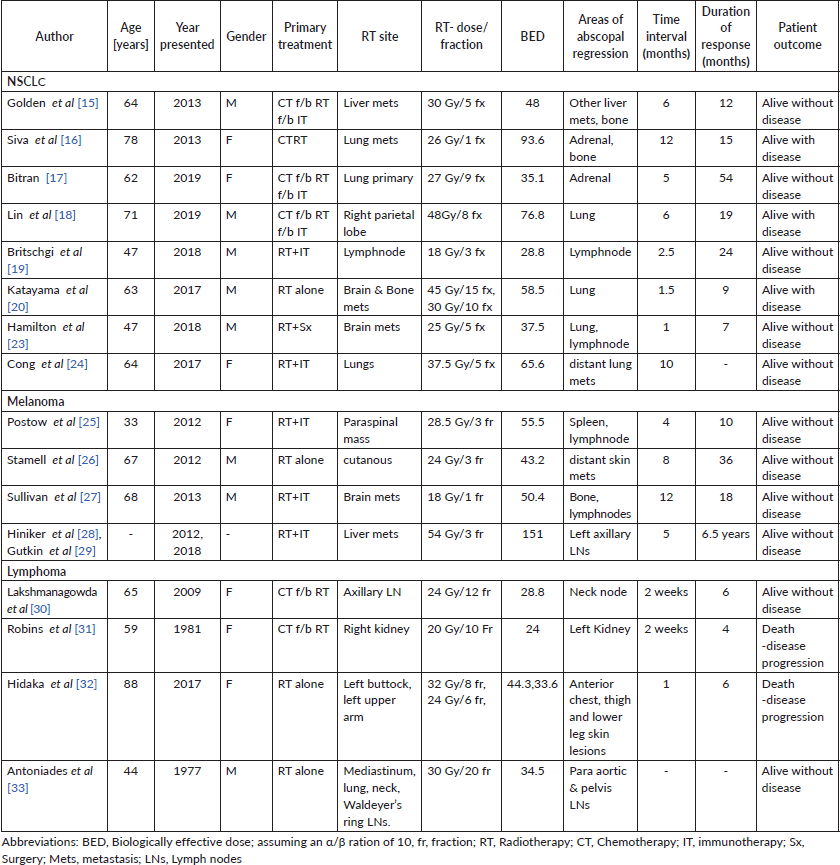Encountering the unicorn – abscopal effect after fractionated stereotactic radiosurgery for brain metastasis in renal cell carcinoma: a case report and review of the literature
Nishana Abbas1 and Durgapoorna Menon2
1Department of Radiation Oncology, Tata Memorial Hospital, Mumbai 400012, India
2Department of Radiation Oncology, Aster Medcity, Cheranellore, Kochi 682034, India
Abstract
Clear cell renal cell carcinoma (ccRCC) is a malignancy with a diverse clinical presentation, often characterised by its resistance to conventional therapies. We present the case of a 53-year-old Indian male diagnosed with ccRCC, pT3aN0M1exhibiting lymphovascular invasion and non-contiguous tumour deposits in the left adrenal gland. Following an initial course of Pazopanib and subsequent Everolimus, the disease progressed. Notably, just 3 months after receiving fractionated stereotactic radiosurgery (FSR) for a cerebellar metastasis, spontaneous regression was observed at a distant skeletal site. This case highlights the significance of considering FSR as a therapeutic option for selected patients with ccRCC, as well as the potential role of an abscopal effect to impact the course of this aggressive malignancy.
Keywords: clear cell renal cell carcinoma, abscopal effect, fractionated stereotactic radiosurgery, brain metastasis, case report
Correspondence to: Durgapoorna Menon
Email: durgapoorna@gmail.com
Published: 12/08/2025
Received: 30/10/2024
Publication costs for this article were supported by ecancer (UK Charity number 1176307).
Copyright: © the authors; licensee ecancermedicalscience. This is an Open Access article distributed under the terms of the Creative Commons Attribution License (http://creativecommons.org/licenses/by/4.0), which permits unrestricted use, distribution, and reproduction in any medium, provided the original work is properly cited.
Background
Clear cell renal cell carcinoma (ccRCC) is the most common subtype of renal cell carcinoma, known for its potential for aggressive growth and metastatic dissemination [1]. Since many decades, the concept of the ‘abscopal effect’ has garnered considerable attention in the context of cancer treatment. This phenomenon has been described when localised radiation therapy triggers a systemic immune response, causing distant metastatic lesions to regress, even if they were not directly targeted by the radiation [2–5].
Here, we present a rare case of ccRCC who underwent fractionated stereotactic radiosurgery (FSR) for a metastatic lesion in the cerebellum. Remarkably, imaging after just 3 months demonstrated a probable abscopal effect, with spontaneous regression of the previously detected distal skeletal lesion.
Case description
The patient, a 53-year-old Indian male, was initially evaluated for a left renal mass and underwent a Laparoscopic Left Nephrectomy. Pathologic evaluation confirmed a ccRCC. The histopathology report revealed lymphovascular invasion and non-contiguous tumour deposits in the left adrenal gland, Stage pT3aN0M1. A postoperative PET CT scan showed no FDG-avid residual disease in the surgical bed or other areas. But there were CT-detected nodules and thickening of fascia in the surgical bed, which suggested a cautious outlook. Since ccRCC is typically FDG non-avid, the patient was initiated on Pazopanib, an oral tyrosine kinase inhibitor.
After 6 months of Pazopanib therapy, a follow-up PET CT scan revealed disease progression. There were multiple FDG-avid soft tissue deposits, including in the left side of the diaphragm, the spleen, the anterior abdominal wall, the iliopsoas, a para-aortic lymph nodal mass and a metabolically active FDG-avid sclerotic lesion in the second lumbar (L2) vertebra. In view of this, the patient was switched to Everolimus, an mTOR inhibitor.
However, 6 months after starting this therapy, he presented with symptoms of nausea, vomiting and mild lower back pain. Magnetic resonance imaging of the brain revealed a solitary 2.5 cm lesion in the right cerebellum, suggestive of brain metastasis. Additionally, a bone scan showed increased tracer uptake in the right pedicle of the L2 vertebrae, (Figure 1a).
Since the right kidney was the only functioning kidney, and in view of the relatively small size of the spinal lesion which was only mildly symptomatic, the multidisciplinary team (MDT) decision was to withhold radiation therapy (RT) to the spine. The patient underwent FSR to the right cerebellar metastasis, receiving a total dose of 27.5 Gy administered in five daily fractions, each delivering 5.5Gy (Figure 2). All systemic therapy was stopped and it was decided to reassess with imaging at 3 months. As per our institutional protocol, a PET scan is ordered only at 6 months post treatment, especially in the palliative setting. Hence, 3 months after FSR, a reassessment bone scan was done that demonstrated a complete response in the non-irradiated site, the L2 vertebral pedicle (Figure 1b). This dramatic response was deemed consistent with the abscopal effect.

Figure 1. (a): SPECT images in metastatic RCC showing increased tracer uptake over the L2 pedicle on the right. (b): SPECT images 3 months after intracranial FSR, showing no tracer uptake over the L2 pedicle on the right.

Figure 2. Intracranial FSR treatment field for cerebellar metastasis.
Discussion
Clear cell renal cell carcinoma is a subtype of renal cell carcinoma known for its resistance to conventional therapies and propensity for metastasis. This case report provides a rare insight into the treatment journey of a ccRCC patient who experienced an abscopal effect at just 3 months after FSR for a brain metastasis. The abscopal effect is a phenomenon where localised radiation therapy to one tumour site induces an immune response that leads to the regression of distant, non-irradiated tumour sites.
Radiation therapy, by causing tumour cell death and the release of tumour neoantigens, can stimulate the immune system [4]. This causes activation of T cell responses that recognise and attack cancer cells leading to the Abscopal Effect. Fractionated regimens activate immune pathways like cGAS–STING, which leads to type I interferon (IFN-1) production, dendritic cell activation and T-cell priming whereas higher single doses (e.g., >20 Gy) may induce TREX1, which degrades cytosolic DNA, suppressing immune activation. Thus, the dose per fraction may be more critical than the total dose in determining immune effects. However, in clinical trials, both fractionation regimens have been shown to induce systemic antitumour response when combined with immunotherapy agents like anti-CTLA-4 or anti-PD-1/PDL-1 agents by overcoming immune checkpoints. RT may also induce immune sensitisation through upregulation of FAS, ICAM1, MHC-I and chemokines like CXCL9/10/16 – a phenomenon akin to a 'vaccine-like effect' [5]. It is still difficult to determine which patient will exhibit an abscopal effect. Hence predictive biomarkers that influence immunogenicity like absolute lymphocyte count, wild-type p53 expression, mutant KPNA2 downregulation and γH2AX may help to identify patients who might exhibit abscopal effect in patients receiving radiotherapy. Additionally, the Vigil vaccine, an autologous GM-CSF–secreting tumour vaccine with TGF-β knockdown, shows promise in priming anti-tumour immunity and enhancing abscopal potential [6]. Although the abscopal effect triggers both our imagination and immunity alike, it was always considered a unicorn by practising oncologists. However, the phenomenon has garnered significant interest in recent years with a windfall of case reports that have likely resulted from the widespread use of immunotherapy combined with the high doses of radiation delivered using stereotactic techniques [5].
In our patient, the ccRCC was initially FDG non-avid, making it challenging to monitor disease progression and response to therapy using conventional imaging techniques. The use of targeted therapies such as Pazopanib and Everolimus demonstrated limited success, underscoring the need for alternative treatment approaches. FSR (Radiotherapy) resulted in a probable abscopal effect in a very short while as evidenced by the complete response observed at the non-irradiated L2 vertebra. This finding raises important questions about the role of immunity in fighting ccRCC and the potential therapeutic benefit of harnessing the abscopal effect. Additionally, although such occurrences are rarely reported, the switch over to Everolimus prior to the FSR may have played a role in enhancing the abscopal effect, as mTOR inhibitors have been implicated in modulating immune responses [7].
Although SPECT-CT has lower sensitivity in RCC than PET-CT, the absence of CT abnormalities both at baseline and follow-up suggests that this may have been a marrow-based lesion [8]. ccRCC is frequently resistant to treatment, and the prognosis for advanced-stage disease is often poor. The clinical significance of the abscopal effect in metastatic ccRCC is unknown. However, the incidence of abscopal responses in renal cell carcinoma patients remains low, at around 0.3% [9]. Table 1 highlights well-documented cases of the abscopal effect in metastatic RCC following both conventional and ablative radiation therapy. These cases demonstrate the potential for favourable outcomes following tumour regression. Notably, none of these patients received systemic treatment at the time of radiation therapy or adjuvant treatment afterward. Interestingly, most reported cases on abscopal effect were on renal cell carcinoma, Non-Small Lung Cancer (NSCLC), melanoma and lymphoma-traditionally regarded as immunogenic. Nevertheless, the abscopal effect has been observed across a range of tumour types, suggesting the potential for the broader application of radiation therapy as an immunomodulatory tool. Its frequency, durability and therapeutic impact are now being more formally explored through clinical trials.
Table 2 highlights case reports and series of abscopal effect in other sites following radiation therapy. In a patient-level meta-analysis of individuals exhibiting the abscopal effect, the 5-year overall survival and 5-year progression-free survival were reported to be 63% and 45% respectively. On univariate analysis none of the variables were statistically significant to predict duration of response or overall survival [34].
Table 1. Case reports of abscopal effect in metastatic RCC.

Table 2. Case reports of abscopal effect in other cancers sites after radiotherapy.

In a series of metastatic breast cancer patients treated with stereotactic body radiotherapy (SBRT) without concurrent immunotherapy, approximately 25% exhibited the abscopal effect. These patients with the abscopal effect experienced a positive impact on overall treatment outcomes, with a promising 1-year progression-free survival rate of 70% [35]. Additionally, a phase II prospective study in NSCLC demonstrated the efficacy of RT in overcoming acquired immunotherapy resistance when administered concurrently with immune checkpoint inhibitors with acceptable toxicity [36]. Notably, in these studies, regardless of the RT dose or volume, the addition of hypofractionated RT in the metastatic setting demonstrated an immune-boosting effect.
The potential for SRS-induced abscopal effects could open new avenues for treatment and significantly impact patient outcomes. Furthermore, the successful management of brain metastasis in a ccRCC patient through FSR underscores the importance of individualised treatment plans, especially in cases where patients have limited treatment options due to their medical history and the nature of their disease. In this case, the MDT made a thoughtful decision to opt for FSR to treat the brain metastasis and to observe the spinal lesion, ultimately resulting in a positive clinical outcome.
It is important to acknowledge the limitations in analysing the abscopal effect, due to reporting bias and the concurrent use of other treatments. Despite the promise of the abscopal effect, its occurrence remains infrequent and predicting which patients will experience it remains a challenge. Additionally, the optimal sequencing and dosing of SBRT and immunotherapy require further investigation. As the understanding of the effect continues to evolve, further research and clinical trials may shed light on its potential application in the management of ccRCC and other malignancies.
Conclusion
Clear cell renal cell carcinoma remains a challenging malignancy to treat, especially in advanced stages. We report a rare ccRCC patient who achieved complete response at a non-irradiated skeletal site at just 3 months post radiation, raising important questions about the immune-mediated responses in ccRCC and the potential role of the abscopal effect in its management. The abscopal effect in itself is a fascinating concept – combining immunotherapy with the high doses of radiation delivered using stereotactic technology has demonstrated considerable promise in triggering this phenomenon. As research in this field advances, a deeper understanding of the abscopal effect and the factors influencing it will likely lead to improved patient outcomes and a brighter future for those with metastatic Renal Carcinomas.
Acknowledgments
Nil.
Conflicts of interest
None.
Funding
The authors have nothing to disclose.
Author contributions
Conception and design: Durgapoorna Menon.
Data collection: Nishana Abbas.
Data analysis and interpretation: Nishana Abbas.
Manuscript writing: Nishana Abbas.
Final approval of manuscript: Durgapoorna Menon.
References
1. Schiavoni V, Campagna R, and Pozzi V, et al (2023) Recent advances in the management of clear cell renal cell carcinoma: novel biomarkers and targeted therapies Cancers 15(12) 3207 https://doi.org/10.3390/cancers15123207
2. Mole RH (1953) Whole body irradiation—radiobiology or medicine? Br J Radiol 26(305) 234–241 https://doi.org/10.1259/0007-1285-26-305-234
3. Papac RJ (1996) Spontaneous regression of cancer Cancer Treat Rev 22(6) 395–423 https://doi.org/10.1016/S0305-7372(96)90023-7 PMID: 9134002
4. National Cancer Institute (2020) Off Target: Investigating the Abscopal Effect as a Treatment for Cancer [Internet] (Cancer Currents Blog) [https://www.cancer.gov/news-events/cancer-currents-blog/2020/abscopal-effect-radiation-immunotherapy] Date accessed: 29/07/25
5. Formenti SC and Demaria S (2013) Combining radiotherapy and cancer immunotherapy: a paradigm shift J Natl Cancer Inst 105(4) 256–265
6. Craig DJ, Nanavaty NS, and Devanaboyina M, et al (2021) The abscopal effect of radiation therapy Future Oncol 17(13) 1683–1694 https://doi.org/10.2217/fon-2020-0994
7. Powell JD, Pollizzi KN, and Heikamp EB, et al (2012) Regulation of immune responses by mTOR Ann Rev Immunol 30(1) 39–68 https://doi.org/10.1146/annurev-immunol-020711-075024
8. Wu HC, Yen RF, and Shen YY, et al (2002) Comparing whole body 18F-2-deoxyglucose PET and technetium-99m MDP bone scan to detect bone metastases in renal cell carcinoma: a preliminary report J Cancer Res Clin Oncol 128(9) 503–506 https://doi.org/10.1007/s00432-002-0370-1 PMID: 12242515
9. Wong A, Vellayappan B, and Cheng L, et al (2021) Atypical response patterns in renal cell carcinoma treated with immune checkpoint inhibitors—navigating the radiologic potpourri Cancers 13(7) 1689 https://doi.org/10.3390/cancers13071689
10. Fairlamb DJ (1981) Spontaneous regression of metastases of renal cancer: a report of two cases including the first recorded regression following irradiation of a dominant metastasis and review of the world literature Cancer 47(8) 2102–2106 https://doi.org/10.1002/1097-0142(19810415)47:8<2102::AID-CNCR2820470833>3.0.CO;2-K PMID: 7226102
11. MacManus MP, Harte RJ, and Stranex S (1994) Spontaneous regression of metastatic renal cell carcinoma following palliative irradiation of the primary tumour Ir J Med Sci 163 461–463 https://doi.org/10.1007/BF02940567 PMID: 7529223
12. Wersäll PJ, Blomgren H, and Pisa P, et al (2006) Regression of non-irradiated metastases after extracranial stereotactic radiotherapy in metastatic renal cell carcinoma Acta Oncol 45(4) 493–497 https://doi.org/10.1080/02841860600604611
13. Ishiyama H, Teh BS, and Ren H, et al (2012) Spontaneous regression of thoracic metastases while progression of brain metastases after stereotactic radiosurgery and stereotactic body radiotherapy for metastatic renal cell carcinoma: abscopal effect prevented by the blood-brain barrier? Clin Genitourin Cancer 10(3) 196–198 https://doi.org/10.1016/j.clgc.2012.01.004 PMID: 22409865
14. Van de Walle M, Demol J, and Staelens L, et al (2017) Abscopal effect in metastatic renal cell carcinoma Acta Clin Belg 72(4) 245–249 https://doi.org/10.1080/17843286.2016.1201614
15. Golden EB, Demaria S, and Schiff PB, et al (2013) An abscopal response to radiation and ipilimumab in a patient with metastatic non–small cell lung cancer Cancer Immunol Res 1(6) 365–372 https://doi.org/10.1158/2326-6066.CIR-13-0115
16. Siva S, Callahan J, and MacManus MP, et al (2013) Abscopal effects after conventional and stereotactic lung irradiation of non–small-cell lung cancer J Thorac Oncol 8(8) e71–e72 https://doi.org/10.1097/JTO.0b013e318292c55a
17. Bitran J (2019) The abscopal effect exists in non-small cell lung cancer: a case report and review of the literature Cureus 11(2) e4118 PMID: 31037232 PMCID: 6478494
18. Lin X, Lu T, and Xie Z, et al (2019) Extracranial abscopal effect induced by combining immunotherapy with brain radiotherapy in a patient with lung adenocarcinoma: a case report and literature review Thorac Cancer 10(5) 1272–1275 https://doi.org/10.1111/1759-7714.13048 PMCID: 6500971
19. Britschgi C, Riesterer O, and Burger IA, et al (2018) Report of an abscopal effect induced by stereotactic body radiotherapy and nivolumab in a patient with metastatic non-small cell lung cancer Radiat Oncol 13 1–4 https://doi.org/10.1186/s13014-018-1049-3
20. Katayama K, Tamiya A, and Koba T, et al (2017) An abscopal response to radiation therapy in a patient with metastatic non-small cell lung cancer: a case report J Cancer Sci Ther 9(2) 365–367 https://doi.org/10.4172/1948-5956.1000443
21. Chino F, Pollis KE, and Choi S, et al (2018) Stereotactic body radiation therapy−induced abscopal effect on hepatocellular carcinoma after treatment for lung cancer: a case report Hepatology 68 1653–1655 https://doi.org/10.1002/hep.30100 PMID: 29888796
22. Kodama K, Higashiyama M, and Okami J, et al (2014) A possible abscopal effect of post-irradiation immunotherapy in two patients with metastatic lung tumors Int Cancer Conf J 3 122–127 https://doi.org/10.1007/s13691-013-0130-x
23. Hamilton AJ, Seid J, and Verdecchia K, et al (2018) Abscopal effect after radiosurgery for solitary brain metastasis from non-small cell lung cancer Cureus 10 e3777
24. Cong Y, Shen G, and Wu S, et al (2017) Abscopal regression following SABR for non-small-cell-lung cancer: a case report Cancer Biol Ther 18 1–3 https://doi.org/10.1080/15384047.2016.1264541 PMCID: 5323011
25. Postow MA, Callahan MK, and Barker CA, et al (2012) Immunologic correlates of the abscopal effect in a patient with melanoma N Engl J Med 366 925–931 https://doi.org/10.1056/NEJMoa1112824 PMID: 22397654 PMCID: 3345206
26. Stamell EF, Wolchok JD, and Gnjatic S, et al (2013) The abscopal effect associated with a systemic anti-melanoma immune response Int J Radiat Oncol Biol Phys 85 293–295 https://doi.org/10.1016/j.ijrobp.2012.03.017
27. Sullivan RJ, Lawrence DP, and Wargo JA, et al (2013) Case 21-2013 N Engl J Med 369 173–183 https://doi.org/10.1056/NEJMcpc1302332 PMID: 23841733
28. Hiniker SM, Chen DS, and Knox SJ (2012) Abscopal effect in a patient with melanoma N Engl J Med 366 2035–2036 https://doi.org/10.1056/NEJMc1203984 PMID: 22621637
29. Gutkin PM, Hiniker SM, and Swetter SM, et al (2018) Complete response of metastatic melanoma to local radiation and immunotherapy: 6.5 year follow-up Cureus 10 e3723
30. Lakshmanagowda PB, Viswanath L, and Thimmaiah N, et al (2009) Abscopal effect in a patient with chronic lymphocytic leukemia during radiation therapy: a case report Cases J 2 204 https://doi.org/10.1186/1757-1626-2-204 PMID: 19946448 PMCID: 2783153
31. Robins HI, Buchon JA, and Varanasi VR, et al (1981) The abscopal effect: demonstration in lymphomatous involvement of kidneys Med Pediatr Oncol 9 473–476 https://doi.org/10.1002/mpo.2950090510
32. Hidaka Y, Takeichi T, and Ishikawa Y, et al (2017) Abscopal effect of local irradiation treatment for diffuse large B-cell lymphoma Acta Derm Venereol 97 1140–1141 https://doi.org/10.2340/00015555-2729 PMID: 28597025
33. Antoniades J, Brady LW, and Lightfoot DA (1977) Lymphangiographic demonstration of the abscopal effect in patients with malignant lymphomas Int J Radiat Oncol Biol Phys 2 141–147 PMID: 403163
34. Hatten SJ, Lehrer EJ, and Liao J, et al (2022) A patient-level data meta-analysis of the abscopal effect Adv Radiat Oncol 7(3) 100909 https://doi.org/10.1016/j.adro.2022.100909 PMID: 35372719 PMCID: 8971834
35. Kim JS and Chang AR (2023) Abscopal effect in metastatic breast cancer treated with stereotactic body radiotherapy in the absence of immunotherapy Front Oncol 13 1243053 https://doi.org/10.3389/fonc.2023.1243053 PMID: 37869087 PMCID: 10587686
36. Popp I, Vaes RD, and Wieten L, et al (2024) Radiotherapy to reinvigorate immunotherapy activity after acquired resistance in metastatic non-small-cell lung cancer: a pooled analysis of two institutions prospective phase II single arm trials Radiother Oncol 190 110048 https://doi.org/10.1016/j.radonc.2023.110048






